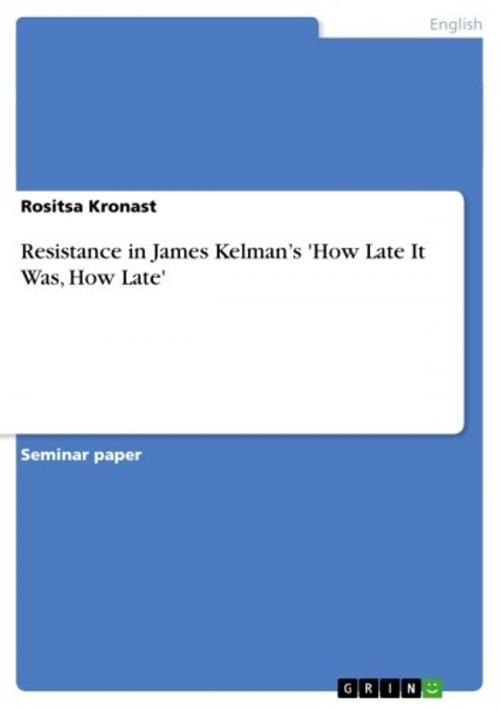Resistance in James Kelman's 'How Late It Was, How Late'
Fiction & Literature, Literary Theory & Criticism, British| Author: | Rositsa Kronast | ISBN: | 9783640566129 |
| Publisher: | GRIN Publishing | Publication: | March 16, 2010 |
| Imprint: | GRIN Publishing | Language: | English |
| Author: | Rositsa Kronast |
| ISBN: | 9783640566129 |
| Publisher: | GRIN Publishing |
| Publication: | March 16, 2010 |
| Imprint: | GRIN Publishing |
| Language: | English |
Seminar paper from the year 2009 in the subject English Language and Literature Studies - Literature, grade: 1,7, LMU Munich (Department für Anglistik und Amerikanistik), course: Hauptseminar Scottish Literature, History and Culture, language: English, abstract: Discussing How Late It Was, How Late, the present paper pays special attention to the modes of resistance as presented in Kelman's text. In this respect, the purpose of my introduction is to explain the terms power and resistance and relate them to the novel. To begin with, for the purposes of this paper I refer to Foucault's definition of power as 'a set of actions upon other actions'. (1982, 789) So, I do not use power in the sense of violence, but in the sense of actions, which induce, ease, restrict or forbid the actions of others. (See Foucault 1982, 789-790) Therefore, power comes to designate a relation and not an attribute. It can be only exerted, but never possessed. Furthermore, power relations are rooted in all social networks. The relations between the main protagonist, Sammy, and the representatives of the social institutions such as policemen illustrate my claim. First of all, in the face of the unemployed, thirty-eight years old Sammy, an eager drinker and smoker with a criminal past, Kelman's text concentrates on a certain group, which epitomizes deviations from the socially accepted norm. In this regard, there is a system of differentiation, determined by law and status, which privileges the institutional representatives over the main character and thus permits them to act upon Sammy's actions. Therefore, the power relations between Sammy and the representatives of the institutions are brought into being by their control over Sammy's actions. Moreover, since power relations lie at the core of society, one cannot escape from them. However, Foucault asserts that: 'To say that there cannot be a society without power relations [...] is not to say that [...] power constitutes a fatality at the heart of societies [...] that cannot be undermined.' (1982, 791) So, one is not a mere victim of the socially established power relations. There are always possibilities for resistance. Moreover, resistance designates the re-employment of the means of power. The language of How Late It Was, How Late, perfectly demonstrates my assertion. The text uses phonetic spellings, profanities, repetitions, linguistic and punctuational inconsistency in order to reproduce the Glaswegian of the working-class. Thus, by appropriating Standard English, in terms of simultaneously taking on and altering it, the Glasgow vernacular becomes a mean of resistance. Similarly to language, the narrative techniques ...
Seminar paper from the year 2009 in the subject English Language and Literature Studies - Literature, grade: 1,7, LMU Munich (Department für Anglistik und Amerikanistik), course: Hauptseminar Scottish Literature, History and Culture, language: English, abstract: Discussing How Late It Was, How Late, the present paper pays special attention to the modes of resistance as presented in Kelman's text. In this respect, the purpose of my introduction is to explain the terms power and resistance and relate them to the novel. To begin with, for the purposes of this paper I refer to Foucault's definition of power as 'a set of actions upon other actions'. (1982, 789) So, I do not use power in the sense of violence, but in the sense of actions, which induce, ease, restrict or forbid the actions of others. (See Foucault 1982, 789-790) Therefore, power comes to designate a relation and not an attribute. It can be only exerted, but never possessed. Furthermore, power relations are rooted in all social networks. The relations between the main protagonist, Sammy, and the representatives of the social institutions such as policemen illustrate my claim. First of all, in the face of the unemployed, thirty-eight years old Sammy, an eager drinker and smoker with a criminal past, Kelman's text concentrates on a certain group, which epitomizes deviations from the socially accepted norm. In this regard, there is a system of differentiation, determined by law and status, which privileges the institutional representatives over the main character and thus permits them to act upon Sammy's actions. Therefore, the power relations between Sammy and the representatives of the institutions are brought into being by their control over Sammy's actions. Moreover, since power relations lie at the core of society, one cannot escape from them. However, Foucault asserts that: 'To say that there cannot be a society without power relations [...] is not to say that [...] power constitutes a fatality at the heart of societies [...] that cannot be undermined.' (1982, 791) So, one is not a mere victim of the socially established power relations. There are always possibilities for resistance. Moreover, resistance designates the re-employment of the means of power. The language of How Late It Was, How Late, perfectly demonstrates my assertion. The text uses phonetic spellings, profanities, repetitions, linguistic and punctuational inconsistency in order to reproduce the Glaswegian of the working-class. Thus, by appropriating Standard English, in terms of simultaneously taking on and altering it, the Glasgow vernacular becomes a mean of resistance. Similarly to language, the narrative techniques ...















